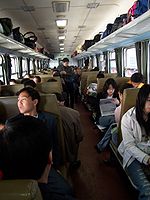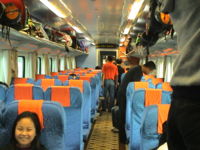
Hard seat
Encyclopedia


Hard seat derives its name from the hard, wooden seats in the Mao era on regular passenger trains. Since the 1990s, "hard seat" on modern trains is not in fact, hard. Many hard seats are quite comfortable, but with respect to soft seat, hard seat carriages are usually more crowded (2+3 vs. 2+2), and people without seats may stand in hard seat carriages.
Each carriage provides the most basic services common to all Chinese trains, namely toilets, wash basins and a boiling water dispenser for the preparation of instant ("pot") noodles and similar foods.
A journey in a hard seat carriage can be a great chance for foreigners to experience Chinese society and customs and interact with many of its peculiarities. However longer trips could prove quite challenging as overcrowding and poor hygienic conditions tend to deteriorate dramatically as the trip progresses. Even longer trips may be overtaxing for a foreign tourist mainly due to the impossibility of sleeping (unless one lies on the floor or in the passageways, as the locals do) and the levels of odor, smell and filth becoming critically intolerable.
Coaches
The coaches current in use include:- YZ-21 (no air conditioner)
- YZ-22 (no air conditioner)
- YZ-22BYZ-22BYZ22B is a series of Chinese railway passenger coach.* Type: Hard seat* Capacity: 118 people* Weight: 43 t* Maximum speed: 120 km/h* Length: 24676 mm* Distance between kingpins: 17000 mm* Height: 4283 mm...
(no air conditioner) - YZ-25BYZ-25BYZ25B is a series of Chinese railway passenger coach.* Type: Hard seat* Capacity: 118 people* Weight: 43 t* Maximum speed: 140 km/h* Length: 26576 mm* Distance between kingpins: 18000 mm* Height: 4433 mm...
(some no air conditioner) - YZ-25G
- YZ-25K
- YZ-25T
- YZ-30
- YZ-32
- SYZ-25B (double-decked)
- SYZ-25K (double-decked)
- Others...
Price
As of 2006, the following ticket price used in most regular lines, but some special lines different price.| Distance (km) | 普通硬座 Regular |
新型空调硬座 New type air-conditioned |
||
|---|---|---|---|---|
| 普快 (pǔ kuài, lit. Normal fast) |
快速 (kuài sù, lit. Fast) |
普快 (pǔ kuài, lit. Normal fast) |
快速 (kuài sù, lit. Fast) |
|
| 1–20 | 2.50 | 3.50 | 7.00 | 9.00 |
| 21–30 | 3.50 | 4.50 | 8.00 | 10.00 |
| 31–40 | 3.50 | 4.50 | 8.00 | 10.00 |
| 41–50 | 4.50 | 5.50 | 10.00 | 12.00 |
| 51–60 | 4.50 | 5.50 | 10.00 | 12.00 |
| 61–70 | 5.50 | 7.00 | 11.00 | 13.00 |
| 71–80 | 5.50 | 7.00 | 11.00 | 13.00 |
| 81–90 | 7.00 | 8.00 | 13.00 | 15.00 |
| 91–100 | 8.00 | 9.00 | 14.00 | 16.00 |
| 101–110 | 8.00 | 9.00 | 15.00 | 17.00 |
| 111–120 | 9.00 | 10.00 | 17.00 | 19.00 |
| 121–130 | 10.00 | 11.00 | 18.00 | 20.00 |
| 131–140 | 11.00 | 13.00 | 19.00 | 22.00 |
| 141–150 | 12.00 | 14.00 | 21.00 | 24.00 |
| 151–160 | 12.00 | 14.00 | 21.00 | 24.00 |
| 161–170 | 13.00 | 15.00 | 22.00 | 25.00 |
| 171–180 | 14.00 | 16.00 | 26.00 | 29.00 |
| 181–190 | 14.00 | 16.00 | 26.00 | 29.00 |
| 191–200 | 15.00 | 17.00 | 27.00 | 30.00 |
| 201–220 | 17.00 | 19.00 | 30.00 | 33.00 |
| (incomplete) | ||||

